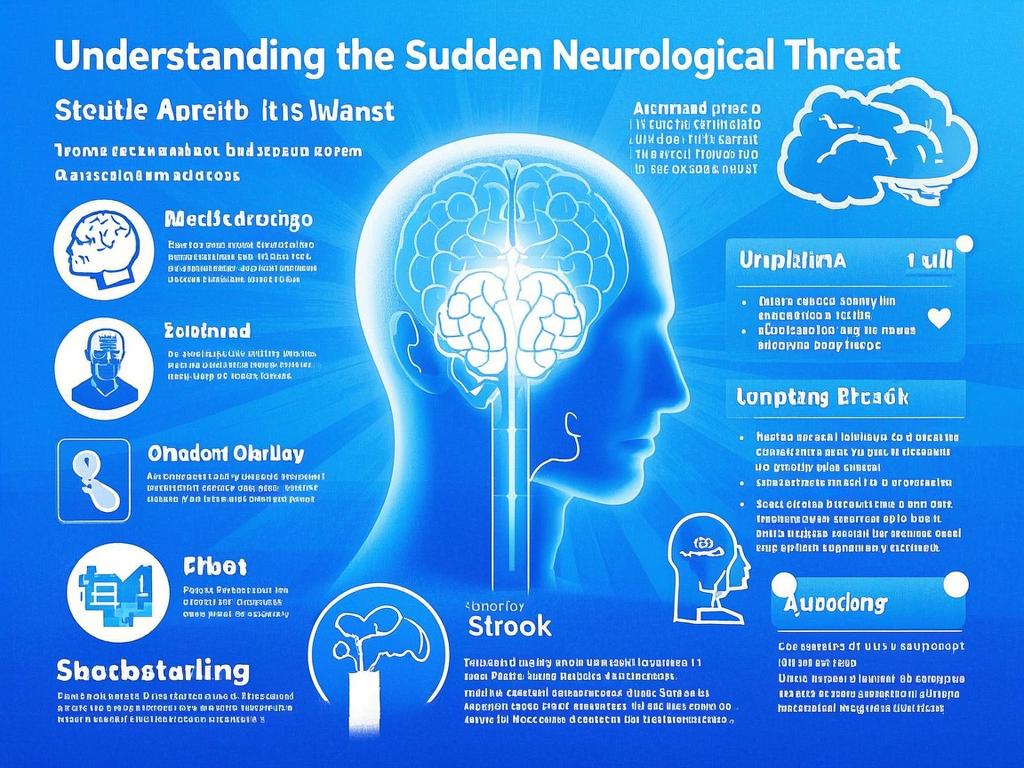
Stroke: Understanding the Sudden Neurological Threat
Hey there, folks! Brace yourselves for a deep dive into the world of strokes, a topic that's as crucial as it is terrifying. Strokes are no joke; they're like the silent assassins lurking in our cerebrovascular systems, ready to strike without warning.
Let's start with some eye - opening stats. According to recent medical research, stroke is the second leading cause of death globally, accounting for approximately 11% of all deaths. That's a staggering number! And it doesn't stop there. Every year, millions more suffer from stroke - related disabilities, which can have a profound impact on their lives and the lives of their families.
Now, what exactly is a stroke? In simple terms, it occurs when the blood supply to part of the brain is interrupted or severely reduced. This can happen in two main ways. Ischemic strokes, which account for about 87% of all strokes, are caused by a blood clot blocking an artery in the brain. It's like a traffic jam on the superhighway of your brain, preventing essential nutrients and oxygen from reaching the cells. Hemorrhagic strokes, on the other hand, are far less common but equally deadly. They occur when a blood vessel in the brain ruptures, flooding the surrounding tissue with blood. It's like a burst pipe in your house, causing chaos and damage.
The historical perspective on strokes is quite interesting. Ancient physicians were aware of the sudden onset of neurological deficits, but their understanding was limited. It wasn't until the 19th century that more in - depth research began. With the advent of modern imaging techniques like MRI and CT scans, we've been able to peer inside the brain and truly understand the mechanisms behind strokes.
One of the most frustrating aspects of strokes is their unpredictability. You can be going about your normal day, feeling fine one moment, and then suddenly, bam! You're hit with a stroke. It's like a bolt out of the blue. But there are risk factors that we can't ignore. High blood pressure, smoking, diabetes, and obesity are among the top culprits. These are like ticking time bombs in our bodies, increasing the likelihood of a stroke.
Let's talk about the impact of strokes on individuals. Imagine losing the ability to move a limb, to speak clearly, or to think straight. It's a nightmare come true. And the emotional toll is just as significant. Patients often struggle with depression, anxiety, and a loss of self - identity. It's a battle on multiple fronts, and it's one that many families have to face.
In the realm of politics and economics, strokes are a huge burden. The cost of treating stroke survivors, both in terms of medical expenses and lost productivity, is astronomical. Governments around the world need to invest more in stroke prevention programs. We need to think of it as an investment in our future workforce, in the well - being of our citizens. It's not just a medical issue; it's a social and economic one too.
Now, let's get to the nitty - gritty of prevention. Lifestyle changes are key. Eating a balanced diet rich in fruits, vegetables, and whole grains is like giving your brain a daily dose of armor. Regular exercise, not just a quick jog around the block but real, sustained physical activity, can strengthen your blood vessels and keep your blood flowing smoothly. And of course, kicking the smoking habit and managing your blood pressure and blood sugar levels are non - negotiable.
But what if you or someone you know has already had a stroke? Well, the race against time to recover is intense. Rehabilitation programs are the lifeline. Physical therapy helps patients regain movement, speech therapy works wonders for those who've lost their ability to communicate clearly, and cognitive therapy sharpens the mind. It's a long and arduous journey, but with determination and the right support, many stroke survivors can make remarkable recoveries.
So, folks, let's take strokes seriously. Let's spread the word about prevention, about the importance of a healthy lifestyle. We can't afford to be complacent. Remember, your brain is your most precious asset. Don't let a stroke steal your quality of life or your future. Let's be the generation that takes control of our cerebrovascular health and beats this silent neurological threat once and for all! Share this knowledge, start those conversations, and let's make a difference together.

